Glucovance
Glucovance dosages: 500/5 mg, 400/2.5 mg
Glucovance packs: 30 pills, 60 pills, 90 pills, 120 pills, 180 pills, 240 pills, 360 pills
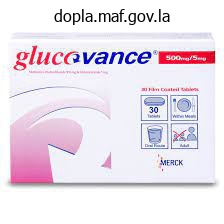
Cost of glucovance
Often symptoms stroke cheap 500/5 mg glucovance free shipping, these infections will present several months after successful treatment of candidemia. Similarly occult or "transient" candidemia may result in seeding of a skeletal focus that becomes clinically apparent at a later time. Vertebral osteomyelitis is a frequent presentation, with local pain and low-grade fever. Organisms transferred to the hub or lumen of the catheter may form a biofilm within the lumen of the catheter and subsequently spread into the circulation. Although such infections are no less serious than those arising from an endogenous source, they may be dealt with somewhat more successfully because removal of the catheter essentially removes the nidus of infection. Of course, if the infected catheter resulted in the seeding of distant organs, the consequences and problems in treating the infection would be the same as those arising from an endogenous source. Culture on standard mycologic medium will allow the isolation of the organism for subsequent identification to species. All other types of infection require culture for diagnosis unless tissue can be obtained for histopathologic examination (see Chapter 60). Cultures of blood, tissue, and normally sterile body fluids also should be performed. Identification of Candida isolates to species level is important, given the differences in response to the various antifungal agents (see Chapter 61). Immunologic, biochemical, and molecular markers for the diagnosis of candidiasis are described in Chapter 60. More deep-seated infections require systemic therapy, the choice of which depends on the type of infection, the infecting species, and the overall status of the host. In many instances, oral fluconazole may be quite effective in treating candidiasis. It may be used in the treatment of peritonitis, as well as in more long-term maintenance therapy of invasive disease after an initial intravenous course of therapy. Fluconazole is efficacious when administered intravenously for the treatment of candidemia in nonneutropenic patients. Those patients who become candidemic while on fluconazole prophylaxis or those with documented infection caused by C. In every instance, care should be taken to remove the nidus of infection if possible. Thus vascular catheters should be removed or changed, abscesses should be drained, and other potentially infected implanted materials should be removed to the extent possible; likewise, efforts should be directed toward immune reconstitution. As in most infectious diseases, prevention is clearly preferable to the treatment of an established candidal infection. Avoidance of broad-spectrum antimicrobial agents, meticulous catheter care, and rigorous adherence to infection-control precautions are a must.
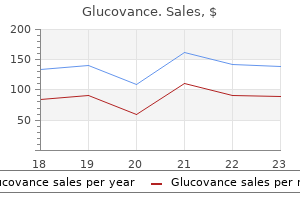
500/5 mg glucovance order amex
A plaque is formed when a single virus infects medicine journal impact factor generic glucovance 500/5 mg without prescription, spreads, and kills surrounding cells. This approach to identifying viruses is similar to that used in the identification of bacteria, which is based on the growth and morphology of colonies on selective differential media. These viruses are not cultured but diagnosed on the basis of serologic findings or through detection of viral genomes or proteins. When released into the cell culture medium, such viruses can be detected by the agglutination of erythrocytes, which is a process termed hemagglutination. These viruses express a hemagglutinin on their surfaces, which binds to erythrocytes of selected animal species. The ratio of viral particles (from electron microscopy) to plaque-forming units (particle to plaque-forming unit ratio) is always much greater than 1 because numerous defective viral particles are produced during viral replication. Detection of Viral Genetic Material the genetic sequence of a virus is a major distinguishing characteristic of the family, type, and strain of virus (see Chapter 5 and Box 39. Sequence-specific genetic probes, genome amplification techniques, and next generation sequencing techniques allow rapid detection, identification, and quantitation with a minimum of risk from infectious virus. This technique is especially useful for detecting latent and integrated sequences of viruses, such as retroviruses, herpesviruses, papillomaviruses, and other papovaviruses, as well as evidence of viruses present in low concentrations and viruses that are difficult or too dangerous to isolate in cell culture. One can quantitate a virus by determining the greatest dilution that retains the following properties (titer): 1. Once the sequence of a fragment or the entire genome has been obtained, its identity can be determined by computer comparison to established databases. Specific viral genetic sequences in fixed, permeabilized tissue biopsy specimens can be detected by in situ hybridization. Detection of Viral Proteins Viral enzymes and other proteins are produced during viral replication and can be detected by biochemical, immunologic, and molecular biological means (see Box 39. The viral proteins can be separated by electrophoresis and their patterns used to identify and distinguish different viruses. The detection and assay of characteristic enzymes or activities can identify and quantitate specific viruses. For example, the presence of reverse transcriptase in serum or cell culture indicates the presence of a retrovirus or hepadnavirus. Antibodies can be used as sensitive and specific tools to detect, identify, and quantitate the virus and viral antigen in clinical specimens or cell cultures (immunohistochemistry). Specifically, monoclonal or monospecific antibodies are useful for distinguishing viruses. Test kits to detect single and multiple (multiplex) viral agents are commercially available. Automated commercial systems are available to analyze a panel of microbes from multiple samples. For example, a commercially available respiratory panel detects 17 viruses and 3 bacteria.
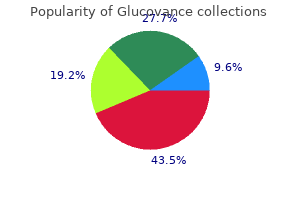
Buy cheap glucovance 500/5 mg on line
The wall of the alimentary tract is composed of submucosal treatment 2 degree burns purchase glucovance online pills, mucosal, and muscular layers. Though it can be asymptomatic for years before the development of symptomatology, patients may experience dysphagia, aspiration, and regurgitation of undigested food. The exact cause is unclear, but proposed mechanisms suggest a dysfunction in coordinated swallowing muscle movement and increased intraluminal pressure in the esophagus. There may be an additive component of long-term upper esophageal sphincter irritation from acid reflux. Although endoscopic direct visualization is possible, caution should be exercised owing to the risk of perforation. Although most patients (>90%) demonstrate symptom improvement, recurrence rates can be as high as 35%. A false diverticulum is a protrusion of the submucosa and mucosa through a defect in the muscular wall of the alimentary tract. Some diverticula cause symptoms depending on their anatomic location or associated pathophysiologic complications. Methods for closure include endoscopic diverticulostomy and myotomy or traditional surgical resection. Owing to the mechanism of formation, traction diverticula are isolated to the middle third of the esophagus. One proposed mechanism is related to a precedent pulmonary infection, most commonly tuberculosis or histoplasmosis, with resultant mediastinal lymph node formation. After the active infection subsides, resultant fibrosis and scarring between the tissues surrounding the mediastinal lymph nodes and esophagus occur. Initially, a small diverticulum develops from this fibrosis, which produces "traction" or a lack of mobility. Diverticular progression results when age-related changes from the dysfunction of coordinated swallowing muscle movement and increased intraluminal pressure in the esophagus develop. Surgical management is rarely needed unless these diverticula become symptomatic or complications, such as fistulas, occur. Epiphrenic Diverticulum Epiphrenic diverticula are false diverticula of the distal esophagus affecting only 0. They are thought to arise secondary to mucosal injury from gastroesophageal reflux and muscle dysmotility. They occur within 10 cm of the gastroesophageal junction, and symptoms include dysphagia, spasmodic chest pain, and gastroesophageal reflux. With progression of diverticular size, obstruction can become a potential complication.
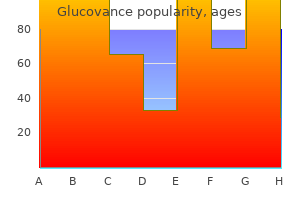
Glucovance 400/2.5mg purchase fast delivery
Multiple injections to the head and neck can be helpful for patients who experience symptoms oo ks m for more than 14 days per month and it can be repeated after 3 months in treatment 1 glucovance 500/5 mg order with amex. Because this treatment is administered by physicians in headache specialty and pain practices, simultaneous comprehensive treatment measures and medication can contribute to positive patient results. Side effects are relatively low when injected by experienced physicians; alteration of facial expressions is the most common. A large meta-analysis of 27 controlled clinical trials concluded that onabotulinumtoxinA injections showed a small to moderate benefit over placebo in patients experiencing chronic migraine and chronic daily headache. The Cefaly head-band apparatus can be self administered 20 minutes daily to reduce migraine frequency. Many of the abortive medications carry significant prescribing limitations that must be taken into consideration. Vasoconstrictor medications are contraindicated in patients with cardiovascular or peripheral vascular disease. As with all medications, the clinician must consider appropriate prescribing, contraindications, and side-effect information. Ergotamine has a relatively long half-life and duration of action (up to 3 days) and should be used no more frequently than every 4 to 5 days to avoid ergotamine rebound headache. The intranasal form (Migranal) is an effective treatment when administered correctly by the patient. It is slow acting and more effective when taken early in attacks and when used for attacks preceded or accompanied by stress and muscle tension of the neck. Although isometheptene is considered less potent than ergotamine and triptans, it is preferred by many patients whose headaches have features of both migraine and tension type. At the present time, seven serotonin agonists (triptans) are approved for abortive migraine treatment in the United States (see Table 3). As a category, the triptans are approximately 65% to 70% effective in published clinical trials. Their similarities are greater than their differences, but each triptan is not necessarily effective for all patients, and familiarity with their differences can be helpful to the treating physician. Half-life, onset and duration of action, adverse events, tolerability, recurrence of headache, and routes of administration may vary and allow the physician to match the medication to the individual patient. For example, a slower onset of action and longer-lasting triptan may be appropriate for slow-onset, longer-lasting migraine attacks. It is thought that peripheral sensitization-allodynia-is a sign of later phase migraine, and treating the attack before this phenomenon occurs is important. When treatment is delayed or the patient awakens with severe migraine, the injection, nasal spray, or rapidly acting triptans may be more beneficial. Although triptans as a group are very effective, recurrence of headache, after initial relief, requiring retreatment is common and can be as high as 40%.
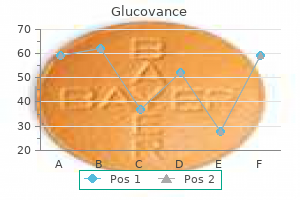
Glucovance 500/5mg otc
Desensitization should be considered if penicillin is the treatment of choice for an infection and no acceptable nonpenicillin alternatives are available medicine pill identification cheap glucovance 400/2.5 mg without a prescription. Desensitization involves administering incremental doses of oral penicillin every 15 minutes for a total of 4 to 12 hours, after which time the first dose of penicillin is given. Angioedema can progress rapidly from a mild swelling of the oral mucosal to a life-threatening laryngeal edema. With this rapid sequence of events, the most important part of treatment is obtaining and maintaining a patent airway. Once the airway is patent, the patient should be treated with H1 antihistamines, H2 blockers, and steroids. H1 antihistamines such as diphenhydramine and hydroxyzine (Atarax) are effective in relieving pruritus but can cause significant sedation. Therefore, second-generation H1 antihistamines (loratadine [Claritin],1 cetirizine [Zyrtec],1 desloratadine [Clarinex],1 fexofenadine [Allegra]1) are often chosen for outpatient therapy. Doxepin (Sinequan),1 a tricyclic antidepressant with potent H1 and H2 blocker activities, can be used as an alternative to H1 antihistamines. However, it should not be used as first-line treatment for acute urticaria and angioedema due to its significant side effects of severe sedation, dry mouth, and weight gain. The rate of cross-reactivity between penicillin and cephalosporins has been historically cited to be as high as 10%. The degree of cross-reactivity is highest between penicillins and first-generation cephalosporins, which have identical R-group side chains. In this case amoxicillin would be cross-reactive with cefadroxil (Duricef) and cefprozil (Cefzil), while ampicillin would be with cefaclor and cephalexin. Because of the differences in the chemical structures, second- and third-generation cephalosporins (cefdinir [Omnicef], cefuroxime [Ceftin], cefpodoxime [Vantin], and ceftriaxone [Rocephin]) are unlikely to be associated with cross-reactivity with penicillin. According to the latest guidelines for acute otitis media from the American Academy of Pediatrics and American Academy of Family Physicians, alternative initial antibiotics in patients with penicillin allergy include cefdinir, cefuroxime, cefpodoxime, or ceftriaxone. Cephalosporin treatment of patients with penicillin allergy who did not have a severe or recent penicillin reaction history shows a reaction rate of 0. Use cephalosporin with caution in patients who report an immediate or accelerated penicillin allergy or those with a positive skin test to penicillin. Beside penicillins, sulfonamide antibiotics are the second most common cause of drug-induced allergic reactions. There are three classes of sulfonamides based on chemical structure: sulfonylarylamines (including sulfa antibiotics), nonsulfonylarylamines, and sulfonamide-moiety-containing drugs. A nonsulfonylarylamine also has a sulfonamide moiety attached to a benzene ring, but it does not have an amine group at the N4 position. A sulfonamide-moiety-containing drug has a sulfonamide group that is not connected to a benzene ring.
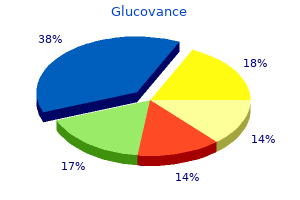
Buy discount glucovance 500/5mg
All patients who receive pacemakers require lifelong follow-up by a trained team of physicians symptoms 0f parkinsons disease 400/2.5 mg glucovance buy, nurses, and ancillary personnel using standard procedures guided by practice guidelines and manufacturer recommendations. Complications Catecholamines used to increase heart rate may precipitate tachyarrhythmias by electrophysiologic effects mediated by adrenergic receptors or by myocardial ischemia, and they may worsen hemodynamic status. Ischemia and receptor-mediated electrophysiologic effects occur immediately after administration; changes in gene expression of ion channels begin as early as several hours; and long-term changes such as myocardial hypertrophy, apoptosis, and fibrosis occur within 24 hours and may progress over much longer periods. This suggests that the duration and dose of catecholamine infusions should be minimized. Complications of temporary transvenous pacing include inadequate pacing or sensing thresholds, vascular complications, pneumothorax, myocardial perforation, infection, and dislodgment. Permanent pacemakers are highly effective, safe, and cost-effective with few contraindications. Although the complications are rarely life threatening, they should be carefully considered and acknowledged. In patients with pacemaker-related endocarditis, the in-hospital mortality rate is reported to be over 7% with a 20-month mortality rate over 25%. About 10% of pacemakers will become infected or develop some other type of failure that may require extraction. In a recent series the rate of major complications associated with extraction was 1. Abandoned leads block venous access and extractions are associated with significant risks. Perhaps of greater consequence is the constant inconvenience of lifelong follow-up, electromagnetic interference, and false alarms from electronic surveillance devices, as well as exclusion from important procedures, such as magnetic resonance imaging of the thorax. Conventional pacing, that is, from the right ventricular apex, is now known to be detrimental and may cause adverse ventricular remodeling, atrial fibrillation, heart failure, and premature death. Although it has been shown that patients with reduced left ventricular function are at greater risk for adverse effects, it is not known how to identify other patients at risk. Strategies for reducing the adverse effects of conventional pacing are under study and recommendations are evolving. Because the decision for pacemaker implantation includes selection of lead configuration, lead locations, and pacing mode, patient guidance and education are complex. Fortunately, current devices and leads are much more reliable than in the past and remote monitoring has enhanced early detection of problems and has substantially reduced the inconvenience of device monitoring. Ongoing clinical trials will provide guidance in pacemaker configurations and programming that will minimize adverse effects. Limiting even further to 1500 mg or less is more ideal and results in a significant improvement in both systolic and diastolic blood pressure typically.
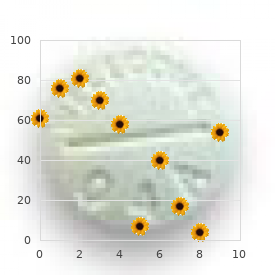
Glucovance 500/5mg order on-line
Lesions usually arise in areas exposed to traumatic implantation and are present in an indolent fashion medicine 5325 purchase glucovance canada, such as nodules and papules, or as an eczematoid eruption. Those individuals presenting with olecranon bursitis are usually not immunocompromised, but most report some sort of penetrating or nonpenetrating trauma to the affected elbow. Signs and symptoms of olecranon bursitis usually occur several weeks after the trauma and include mild induration of the bursa, tenderness, erythema, and production of a variable amount of serosanguineous fluid. Disseminated protothecosis is rare but has been reported in individuals with no known immunologic deficiency. One patient with visceral protothecosis presented with abdominal pain and abnormal liver function studies that were initially considered to be the result of cholangitis. The patient had multiple peritoneal nodules that resembled metastatic cancer but were in fact manifestations of protothecosis. Protothecosis Protothecosis is an infection of humans and animals caused by achlorophyllous algae of the genus Prototheca. These organisms belong to the same family as the green algae of the genus Chlorella. Three forms of human protothecosis have been described: (1) cutaneous, (2) olecranon bursitis, and (3) disseminated. The sporangiospores are released after rupture of the sporangium and in turn develop into mature endosporulating forms. The cells measure 3 to 30 m in diameter and differ from those of Chlorella by the lack of chloroplasts. The two species of Prototheca that cause human disease differ from one another in size: P. A wet mount of the culture material may be stained with lactophenol cotton blue to reveal the characteristic sporangia and sporangiospores. The organisms are quite metabolically active and may be identified to species using one of several commercially available yeast identification panels to determine the carbohydrate assimilation profile. Human protothecosis has been reported on all continents with the exception of Antarctica. In addition to the size differences noted previously, the two species of Prototheca differ in that P. Repeated drainage has failed; however, drainage coupled with local instillation of amphotericin B was curative in one patient. Treatment of cutaneous protothecosis with a variety of topical and systemic antibacterial, antifungal, and antiprotozoal agents has been unsuccessful. Local excision coupled with topical amphotericin B, systemic tetracycline, and systemic ketoconazole has proven useful, despite ketoconazole-related hepatotoxicity. Disseminated protothecosis has been treated with systemic antifungal agents; both amphotericin B and ketoconazole have been used.
Glucovance 400/2.5 mg amex
These antibodies include an IgM heterophile antibody that recognizes the Paul-Bunnell antigen on sheep symptoms with twins discount generic glucovance uk, horse, and bovine erythrocytes but not that on guinea pig kidney cells. The heterophile antibody response can usually be detected by the end of the first week of illness and lasts for as long as several months. Establishes latency in hematopoietic stem cells and monocytes Cell-mediated immunity is required for resolution and maintenance of latency and contributes to symptoms. Only a quarter of its genes are required for replication, whereas most of the other genes manipulate host interactions and the immune response. This may facilitate the establishment of latent infection in myeloid stem cells, monocytes, lymphocytes, the stromal cells of the bone marrow, or other cells. After being activated by the viral protein kinase, acyclovir will reduce viral shedding but not disease. The ubiquitous nature of the virus and the potential for asymptomatic shedding make control of infection difficult. Therefore the best means of preventing infectious mononucleosis is exposure to the virus early in life because the disease is more benign in children. Treatment with ganciclovir and a nonsteroidal antiinflammatory drug stopped the growth of these cells. Transmission Transmission occurs via blood, organ transplants, and all secretions (urine, saliva, semen, cervical secretions, breast milk, and tears). Virus is transmitted orally and sexually, in blood transfusions, in tissue transplants, in utero, at birth, and by nursing. Babies Babies of mothers who experience seroconversion during term are at high risk for congenital defects Sexually active people Blood and organ recipients Burn victims Immunocompromised people: symptomatic and recurrent disease Geography/Season Virus is found worldwide. Screening potential blood and organ donors for cytomegalovirus reduces transmission of virus. The virus establishes latency in hematopoietic progenitor cells in the bone marrow and monocytes. Virus can be transmitted to other individuals by means of blood transfusions and organ transplants. Approximately 1/10,000 live births will be born with cytomegalic inclusion disease. Disease signs include small size, thrombocytopenia, microcephaly, intracerebral calcification, jaundice, hepatosplenomegaly, and rash. Fever, splenomegaly, and atypical lymphocytosis usually begin 3 to 5 weeks after transfusion. In immunocompromised people, it causes symptomatic primary or recurrent disease (see Table 43. The graft may succumb to virus replication or cytolytic immune responses to the viral antigens.
Ningal, 22 years: Advanced cardiac life-support guidelines apply to the patient who is unresponsive or severely compromised by heart block. In vivo, B-cell activation and proliferation occurs and is indicated by the spurious production of an IgM antibody to the Paul-Bunnell antigen, termed the heterophile antibody (see later discussion of serology).
Cruz, 58 years: Nasal smears looking for eosinophils are not recommended for routine use in the diagnosis of allergic rhinitis. Patients er na should be educated on the signs of angioedema and provided with proper emergency instructions on how to proceed if angioedema should occur.
Ines, 60 years: Microscopically, the Mucormycetes are molds with broad, hyaline, sparsely septate, coenocytic hyphae. The cathartic effects of nonabsorbable disaccharides may result in profuse diarrhea, dehydration, and hypernatremia.
Mannig, 51 years: Laboratory Diagnosis Infection is confirmed by the microscopic examination of stool specimens in which typical trophozoites can be seen. The rhinorrhea increases and is then accompanied by symptoms of nasal obstruction.
Charles, 25 years: A colonoscopy should be performed to evaluate the extent of diverticular disease and to rule out other comorbid pathology in all patients. The final letter in the mnemonic, E, stands for erythropoietin (high endogenous levels-such as in chronic obstructive pulmonary disease-or exogenous levels) and endocrine disorders (hypothyroidism or hyperparathyroidism).
Jaroll, 36 years: It can penetrate the bloodbrain barrier and is effective in all stages of trypanosomiasis. Continued use of tobacco results in a 10-fold increase in the risk for major amputation and a more than 2-fold increase in mortality.
Goose, 35 years: A heparin-dependent antibody binds to platelets, activates them with the release of procoagulant microparticles leading to an increase in thrombocytopenia, and results in both arterial and venous thrombosis. A magnetic resonance imaging scan of the head showed two large ring-enhancing lesions with possible central necrosis.
Grok, 31 years: Patient outcomes were related per decade of age to the usual blood pressure at the start of that decade. During his expedition, he killed a polar bear and, as part of the "ritual," ate a piece of raw heart muscle from the bear.
Folleck, 21 years: The clinical entities of black and white piedra involve the hair and are characterized by nodules composed of hyphae that encompass the hair shaft. Endoscopy is the preferred treatment modality for stable patients owing to its potential for diagnosis and treatment options.
Luca, 34 years: We have deliberately attempted to simplify the taxonomy by using it to address the major divisions involved in medical parasitology: specifically, intestinal and urogenital protozoa, blood and tissue protozoa, nematodes, trematodes, cestodes, and arthropods. Minimally invasive endoscopic therapy for achalasia is promising and may provide a competing approach.
8 of 10 - Review by F. Ballock
Votes: 128 votes
Total customer reviews: 128
